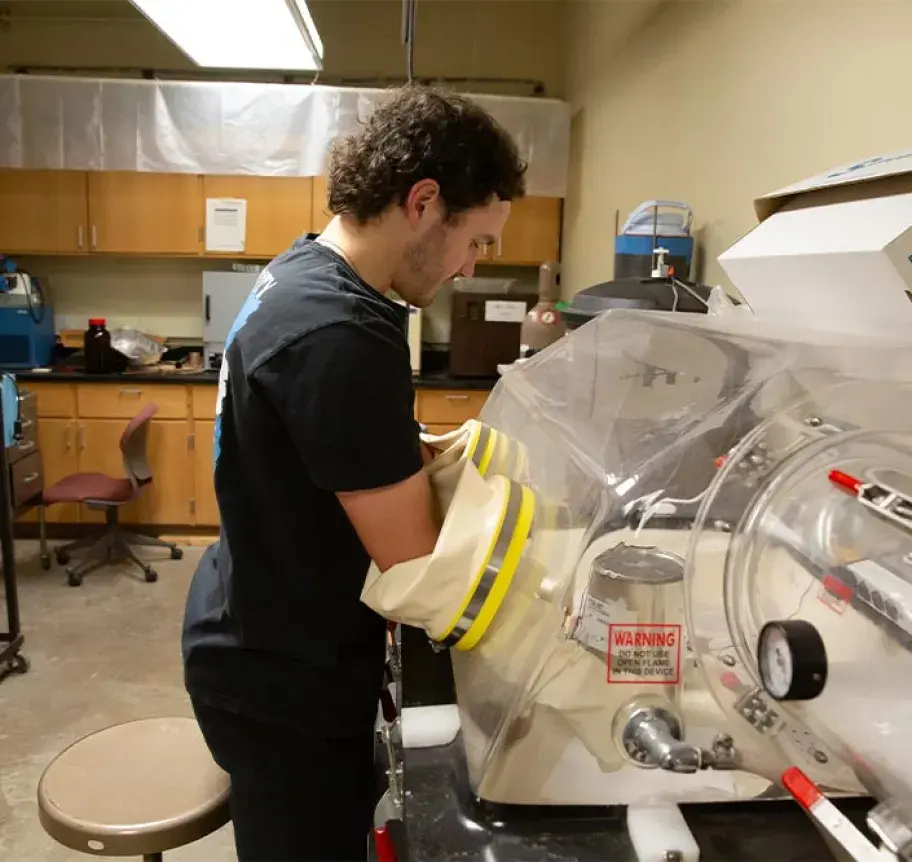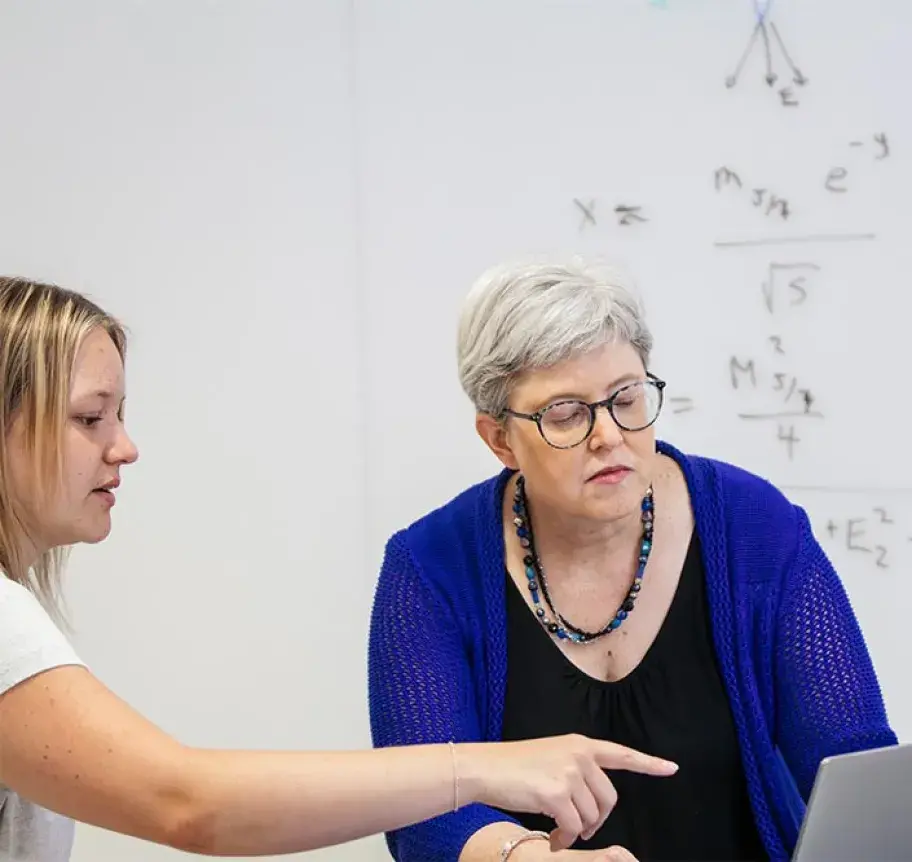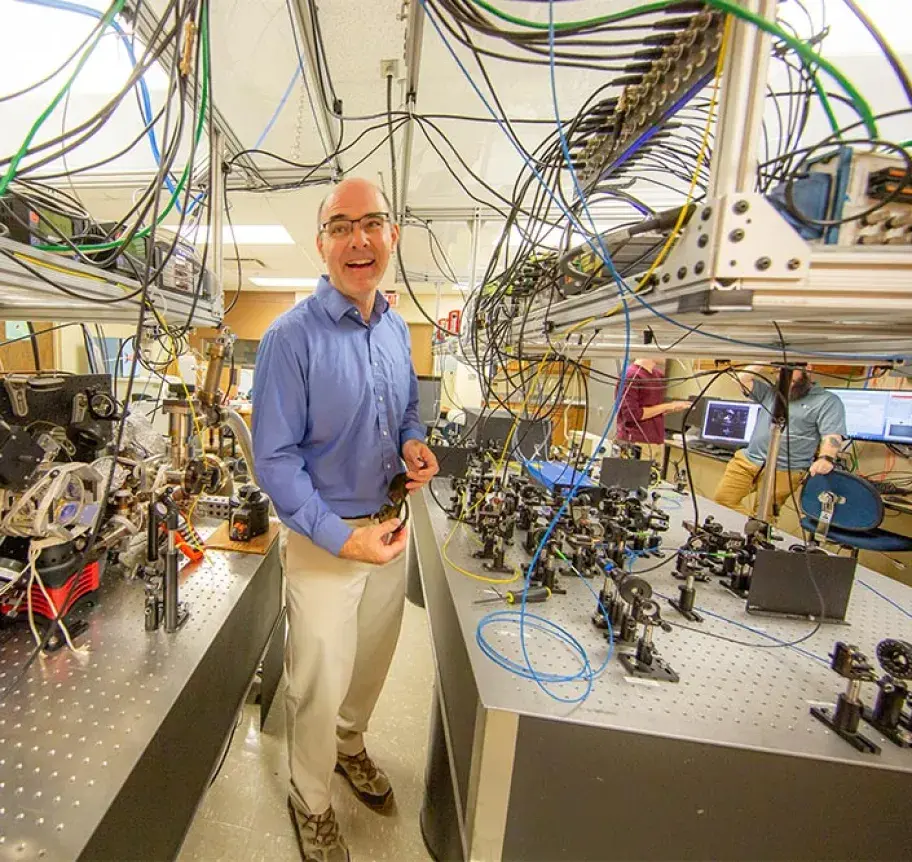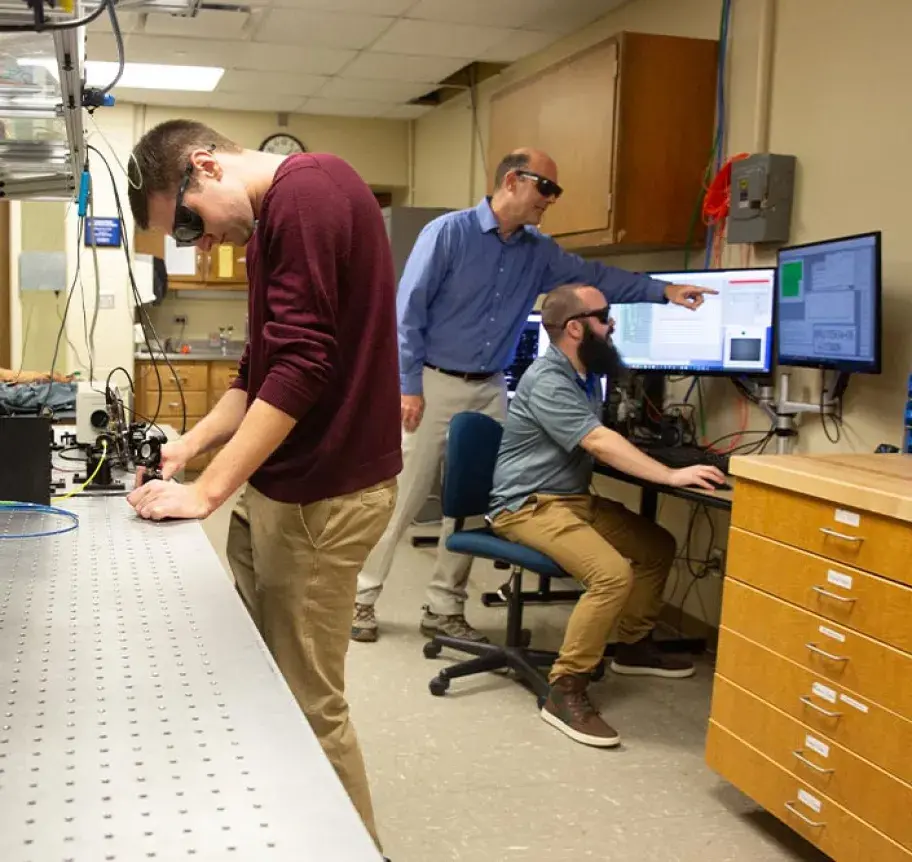
Physics Degree (BS and BSPhy)
A physics degree offers a basis for a wide variety of fields, because at the heart, it’s a study of how things work. Creighton’s Bachelor of Science (BS) and Bachelor of Science in Physics (BSPhys) touch on important philosophical questions in theories of relativity and quantum mechanics and using mathematics, computers and instrumentation as tools for research.
Majoring in physics affords you a deep understanding of nature, a great deal of flexibility in your choice of career, and exceptional strength and stability in the job market. Creighton’s physics program offers a hands-on learning experience that will help you prepare for your next step, whether that’s a job or advanced study.
Program Details
With a physics degree, you’ll learn about:
- The fundamental concepts in each of the major areas of physics
- How to use concepts from multiple areas of physics to solve problems
- Conceptual problem solving
- Application of mathematics to physics
- Design, measurement and analysis techniques required in the laboratory
- How to work as a member of a team
- How to synthesize current knowledge and apply it to new situations
- How to work through ethical issues in physical science
- How to effectively present the results of quantitative studies
Creighton offers two paths in the undergraduate physics program. The two paths are similar, but they’re designed to prepare you for different areas.
Bachelor of Science (BS) with a Physics Major
The Bachelor of Science (BS) with a physics major provides the necessary preparation for entry-level work as a physicist in government or industry. It also prepares you for entry-level work or graduate study in a wide variety of interdisciplinary science and engineering fields, including astronomy and astrophysics, computational physics, geophysics, planetary science, electrical engineering, nuclear engineering, etc. Also, the program is highly recommended for any career in which a liberal arts degree with a concentration in physics may be desirable–scientific writing and reporting, criminology, patent law, scientific equipment sales, high school physics teaching (when combined with the required education courses), to name just a few. Students should work closely with their advisors in choosing electives to prepare for specific career goals.
Bachelor of Science in Physics (BSPhy) with a Physics Major
The Bachelor of Science in Physics (BSPhy) with a physics major provides a strong foundation for careers in the rapidly developing high-technology industries. It is highly recommended as preparation for graduate work in physics. It also prepares students for graduate study in most engineering fields without requiring the early specialization, typical of undergraduate engineering programs, that can greatly reduce career options.
Take a closer look at the difference between these options by viewing the curriculum:
Declaring a Physics Major
To declare a major in physics, a student must have completed one of the general physics sequences: PHY 211 and PHY 212 or PHY 213 and PHY 214 or PHY 221 and PHY 212 or received an “A” or “B” in PHY 211, PHY 213, or PHY 221.
Teacher Certification
Students seeking certification in physics in secondary education must consult with the education department, the physics department and with the appropriate agency in the state in which they intend to teach.
Arts-Engineering Program
You may choose to transfer to an engineering school after graduation or at an earlier point in your academic career. If you wish to earn an engineering degree after earning a Creighton degree, you might consider the applied physics and pre-engineering major.
You can also obtain the equivalent of one or two years of pre-engineering study and then transfer to an engineering school.
A study of the first-year program at the engineering college of your choice will reveal those variations, which can be accommodated in your schedule. (Students wishing to spend a second year at Creighton before making application to an engineering school are advised to contact that school directly for explicit approval of a second-year schedule.)
A formal agreement exists between Creighton University and Detroit-Mercy’s Engineering School, but students should not consider this to be their only option.
If you see graduate school in your future, why not start sooner?
Get a head start with one of our multiple master’s while finishing up your bachelor’s degree. Choose a Master of Education in Secondary School Teaching and earn an endorsement in your teaching preparation or start working toward a Master of Science in Medical Physics.
Learn how to save a year of time and tuition through our Accelerated Bachelor’s to Master’s programs.
Minors
Physics Minor
The physics minor provides a thorough introduction to the theoretical and experimental methods extensively used by physical scientists and engineers. You’ll develop practical quantitative problem-solving skills, which are valuable regardless of your major. View the curriculum for the physics minor.
Biological Physics Minor
The biological physics minor provides you with an opportunity to apply the concepts and methods of the physicist to advance your understanding of the life sciences. Students pursuing careers in medicine or the life sciences can use this minor to improve their preparation for the interdisciplinary nature of modern science. See the curriculum for the biological physics minor.
Admissions Requirements
Creighton admissions are based upon:
- High school GPA
- ACT or SAT scores*
- Extracurricular activities
- Personal statement to demonstrate creative abilities not reflected in your transcripts
- Recommendation from high school counselor
- Honors sections and advanced placement courses will enhance a candidate’s application
*For students who are choosing to apply test-optional, ACT/SAT exam scores are not required at the time of application for admission.
Dates & Deadlines
Applications for the fall semester open on Aug. 1 of the prior year. For scholarship consideration, the earlier you complete your undergraduate application, the better. For up-to-date deadlines, visit our admissions page.
Tuition & Financial Aid
Tuition rates are updated each year. Visit our admissions and aid information to learn more about the cost of attendance.
Financial Aid
To help make your undergraduate studies at Creighton University more affordable, we encourage you to file the FAFSA to apply for financial assistance. A variety of scholarships are also available, including those specifically for physics majors, such as:
Michael Anderson Award
Awarded to the student entering modern physics who had the best performance in general physics, following in the spirit of Major Michael Anderson.
Physics Alumni Award
Awarded to the senior physics major with the best performance on the modern physics section of the Graduate Comprehensive Exam.
Schrodinger Cat Award
Awarded to a junior or senior level female physics major actively engaged in research with a cumulative GPA of at least 3.25.
Clare Boothe Luce Program for Women in Science Scholarship
Each year, Creighton University awards Clare Boothe Luce Scholarships for undergraduate women in science to students entering their junior or senior year. The scholarships cover the full cost of tuition and fees and include a housing and book allowance. The scholarships are awarded to female students majoring in the natural sciences, mathematics or computer science and who intend to pursue graduate degrees in one of these fields. Students receiving the scholarship are expected to conduct research in their field.
Recent physics graduates have accepted employment at:
- University of Iowa
- Fidelity National Financial
- University of Nebraska Medical Center
- Capuchin Volunteer Corps
- Cerner Corporation
The acceptance rate for Creighton physics majors applying to graduate or professional programs is over 95%. Graduates have entered a variety of engineering fields, including electrical engineering.
Creighton physics graduates have been accepted to graduate programs at:
- Tulane University
- University of Rochester
- Case Western Reserve University
- University of Iowa
- University of California, San Diego
- University of Minnesota, Twin Cities
- Notre Dame University
- Arizona School of Dentistry and Oral Health
- Rice University
- Johns Hopkins University
- Massachusetts Institute of Technology
- Mayo Catholic University
Undergraduate and graduate physics students currently participate in research projects in areas such as:
- Astro-particle physics
- Observational astrophysics
- Atomic physics
- Biophysical optics
- Computational molecular biophysics
- Condensed matter
- Cosmic ray astrophysics
- High energy nuclear physics group
- Laser-cooled atoms
Visit the Center for Undergraduate Research and Scholarship or the Physics department research page for more information.
Career Options
Creighton’s physics program is designed to combine a solid foundation in physics with adaptability to a wide range of personal interests and career objectives. Graduates with solid scientific backgrounds are in high demand.
Our programs lay the foundation for careers in fields such as these listed below. Graduates who chose physics as a major are also employed as physicians, dentists, lawyers and teachers.
- Astronomy
- Astrophysics and space exploration
- Atomic physics
- Biophysics
- Computer science and technology
- Electronics and photonics
- Elementary particle physics
- Holography
- Laser physics
- Mathematical physics
- Medical physics
- Nuclear physics
- Optics
- Solid state physics
- Superconductivity









